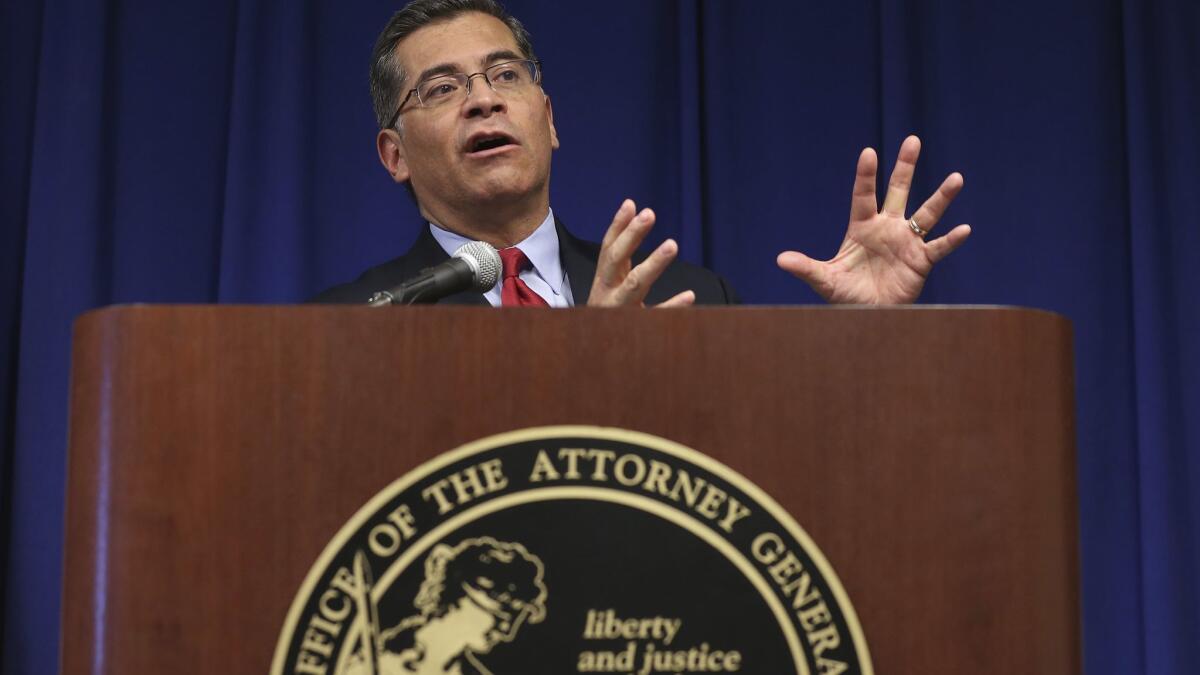Editorial: California voters need unbiased ballot information. Instead, Becerra is playing favorites

This November, with more than a dozen measures up for a vote, state residents will again be bombarded with campaign mailers, TV commercials and radio ads. Even the most conscientious Californian can struggle to find the truth in the barrage of spin, which is why voters need clear, impartial language on their ballots.
In theory, California’s attorney general does just that, writing neutral, evenhanded summaries for ballot measures. In practice? The attorney general’s office often forsakes impartiality in favor of loaded and misleading language designed to sway voters. The current attorney general, Xavier Becerra, is no different.
Becerra is facing a slew of lawsuits this election season from groups that accuse his office of writing titles and 100-word summaries for ballot measures that aim to tip the scales in favor of his political allies — namely, labor unions and the Democratic Party. His critics raise legitimate gripes.
Take, for example, Proposition 22, which would allow drivers for Uber, Lyft and other app-based companies to be classified as independent contractors instead of employees. In January, Becerra’s office gave the measure a straightforward title: “Changes employment classification rules for app-based transportation and delivery workers.” But last month, the office opted for a title that reads like a criticism: “Exempts app-based transportation and delivery companies from providing employee benefits to certain drivers and delivery workers.”
Backers of Proposition 22 are suing Becerra’s office, arguing that the new title is false and prejudicial. It ignores the initiative’s requirement that companies provide some employee-like benefits to drivers, and it parrots the arguments made by labor groups and others opposing Prop 22. Plus, Becerra is hardly a neutral party on the issue — he is suing Uber and Lyft for allegedly misclassifying drivers.
There are similar complaints from opponents of propositions that would raise taxes on certain commercial and industrial properties; allow race and gender preferences in public college admissions and government contracts; increase punishment and limit parole for certain offenses; and change the rules for kidney dialysis clinics.
Under state law, the attorney general is responsible for writing evenhanded ballot titles and summaries that are not “likely to create prejudice.” But attorney generals are partisan elected officials, and they frequently insert their politics into the job. This has been a problem for decades.
The solution? Give ballot title and summary duties to an apolitical third party. The most logical option would be the Legislative Analyst’s Office, which already does a good job writing dispassionate ballot analyses. But several attempts by lawmakers to shift the responsibility to the LAO have failed — often on a party-line vote in the Democrat-controlled Legislature.
Democrats apparently don’t want to give up their power to tip the scales. That’s a shame. It will probably take a citizen-driven initiative to change the state Constitution and reassign the job to a nonpartisan agency. That is — if they can get a fair shake on the title and summary.
More to Read
A cure for the common opinion
Get thought-provoking perspectives with our weekly newsletter.
You may occasionally receive promotional content from the Los Angeles Times.






